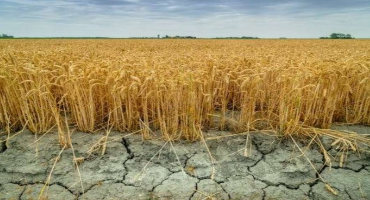Heavy farming machinery contributes to the compaction of soils over time.
Root breakthrough
Our study found that this signal or "switch" is controlled by a hormone called ethylene, which is released as a gas from the tips of plant roots. In loose, non-compacted soils, this gas is free to diffuse into the earth. But in hard, compacted soils, the ethylene gas cannot diffuse, and is instead trapped in the area occupied by the root tip—causing ethylene to build up in root tissues themselves.
This ethylene build-up, our study has found, prompts roots to stop growing longer in compacted soil. Ethylene therefore acts as a very clear "stop" signal to the extension of roots into compacted soils.
In our experiments, we used plants with a specific genetic mutation that left them no longer able to sense ethylene signals. We found that roots do have the ability to penetrate compacted soil, but elect not to when presented with the ethylene-based stop signal.
We deliberately performed our studies using two very different types of soil (sand and clay) and two very different species of plant: rice and Arabidopsis (a close relative of oil seed rape). The fact that we observed the same behavior in different soils and plants suggests that our findings may be widely applicable to other crops, soil types and geographies.
Our findings open up new opportunities to select new, compaction-resistant crops—just as Gregor Mendel, "the father of genetics," first selectively bred different varieties of peas. Breeders can now simply screen their collections for varieties whose roots are less sensitive to ethylene, choosing to create new plants with this differentiation.
However, as this hormone signal is also important for other plant processes like resistance to pathogens, more targeted gene editing and genetic modification (GM) approaches could also be adopted to only block the ethylene response in root tip tissues, rather than the plant as a whole. Time will tell which of these distinct approaches will prove the most effective.

Plants with deeper root systems are more resilient to droughts.
Boosting agriculture
Our findings have the potential to lead to protected or increased crop yields worldwide, especially given that soil compaction remains a persistent problem in intensive agriculture practices. In Europe alone, 36 million hectares (out of a total of 68 million hectares) of farmed land is prone to soil compaction.
Crops with roots that can penetrate deeper into this compacted soil will offer a number of obvious benefits. First, crop roots will be able to access sources of nutrients in deeper soil layers which are currently unavailable to them. That will in turn support the growth of larger, healthier crops.
Click here to see more...